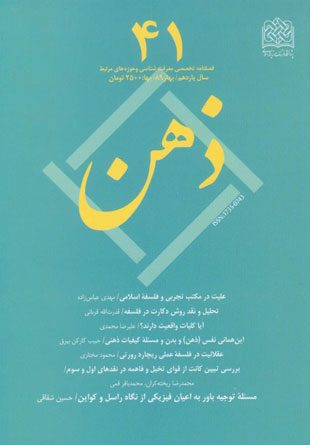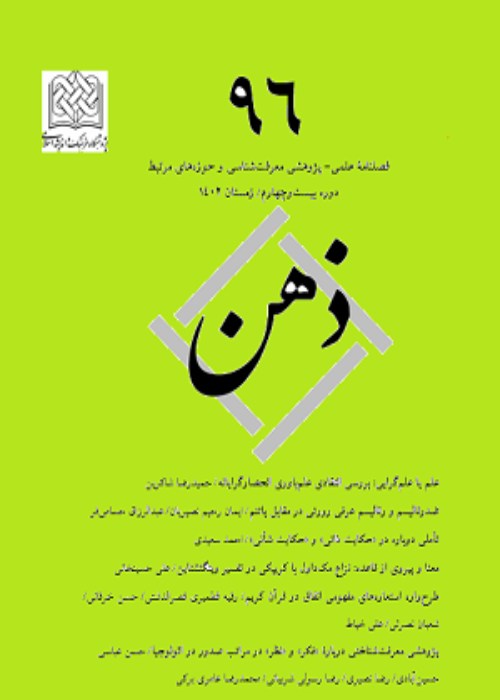فهرست مطالب

فصلنامه ذهن
سال یازدهم شماره 1 (پیاپی 41، بهار 1389)
- 166 صفحه، بهای روی جلد: 25,000ريال
- تاریخ انتشار: 1389/02/14
- تعداد عناوین: 7
-
صفحه 23
-
صفحه 45
-
Page 5Since olden times, causality has been one of the fundamental notions of philosophical thought. In the present writing, the author tries to explain development of the notion of causality in the West, as it has been presented by empiricist schools of thought. This development is as a matter of fact development of the way that interpretation of causality has become subjective. Then, causality in the Islamic thought in the field of Peripatetic philosophy and in particular Transcendent Philosophy will be explained. In the Islamic philosophy, causality is of an objective characteristic. The origin of objectivity of causality in Islamic philosophy, i.e. secondary intelligibles, provides a basis to criticize subjective interpretation of causality in the Western Empiricism.Keywords: causality, cause, effect, secondary intelligibles, necessity, contingency, existence, quiddity, intellect, experience
-
Page 23Importance of Descarte's methodology and philosophy is an evident point which has been of great influences after him. Aiming to produce a single methodology to unify sciences and achieve philosophical certainty, in the first place, he criticizes methods of previous scholars, and then, mentions obstacles to man's philosophical knowledge and explains how to remove them. Then, he describes his own methodology. In Descarte's methodology, certain mental rules, finding simple concepts through analysis, producing combined concepts through synthesis, using clear and distinct concepts, and intuition and inference play important roles. He takes mathematical argumentation as the basis of his own philosophy, and tries, while applying mathematical properties to other sciences and unifying them through mathematical methodology, attain philosophical certainty. In his methodology, however, he faces fundamental and functional difficulties. For example, he tries to mathematicize certainty, whereas his most important philosophical principle (cogito) is a nonphilosophical one. His great attention paid to the role played by method in his own philosophy causes him to neglect importance and even priority of the subject-matter of knowledge to its method and important differences existing between subjects and methods of empirical sciences on the one hand and humanities on the other which will have unfavorable consequences. In the present article, the author tries to, while explaining Descarte's method, study some critiques of his method.Keywords: mathematical method, intuition, inference, subject, matter of knowledge, empirical sciences, humanities, clarity, distinctness
-
Page 45Universals are a class of mind independent entities, usually contrasted with individuals (or so-called “particulars”), postulated to ground and explain relations of qualitative identity and resemblance among individuals. Individuals are said to be similar in virtue of sharing universals. An apple and a ruby are both red, for example, and their common redness results from sharing a universal. If they are both red at the same time, the universal, red, must be in two places at once. This makes universals quite different from individuals, and controversial. Whether universals are in fact required to explain relations of qualitative identity and resemblance among individuals has engaged metaphysicians for two thousand years. Disputants fall into one of three broad camps. Realists endorse universals. Conceptualists and Nominalists, on the other hand, refuse to accept universals and deny that they are needed. In the present article, the author explains various view concerning universals. Also, challenges faced by such approaches will be studied; and finally, based on a realist view, he will try to prove [existence of] universals.Keywords: universals, individuals, realism, nominalism, conceptualism, qualitative identity, property
-
Page 67Since olden times, there have been materialist theories according to which man's reality is confined to this material body. One of the materialist theories of the present time which has been introduced in a new way concerning relationship between the soul and body is "identity of the soul (mind) and body". This theory which is one of the theories of the contemporary philosophy of mind was introduced when Ryle's behaviorism was criticized. As understood from the term "identity", [according to this theory] the soul- or, as it is today popular in the philosophy of mind, the mind- is the same as body (brain). In other words, there is no immaterial thing such as mind, and what there is is only brain and nothing else. Basis of such an illusion is some sort of strong scientism; for, those advocate this theory hold that in the same way that science has found that for example water is nothing other than H2O, some day, it will be found that mind is nothing other than brain.Keywords: soul, mind, body, identity, qualia, first person perspective
-
Page 91The common interpretation of natural sciences is that such sciences are, in terms of their particular methodology or particular relation to reality, other than other fields; and they are regarded as the pattern of rationality. According to Rorty who rejects in principle distinction between natural sciences and other sciences, difference between rational and irrational has nothing to do with difference between methodologies of sciences; and in his rationality, humanities are not excepted. Instead of traditional quest for an absolute criterion for rationality, he advances the issue of attempt to make network of beliefs consistent and transparent in the course of dialogue. The present article presupposes that Rorty's approach may be in principle understood within an anti-Platonic framework. At the same time, Rorty's pragmatist view will be, with some sympathy, explained; and his positions concerning weak and strong versions of scientific rationality will be introduced. It will be shown that Rorty's rationality is nearer to the weak version of scientific rationality.Keywords: Richard Rorty, scientific rationality, pragmatism, relativism, epistemology
-
Page 109In the present article, authors will study imagination and understanding in the first and third Critiques. At first, they will throw a glance on three syntheses in the first Critique (in his three syntheses, Kant shows that how faculties of sensibility, imagination, and understanding work together to acquire knowledge of an idea). Then, they will study each of these faculties in the first and third Critiques. While studying imagination, they will show that in the first Critique, this faculty follows understanding and acts based on its concepts, whereas in the third Critique, it will be freed from such function and schematize even without concepts. When the faculty of understanding is studied, it will be shown that in the first Critique, it acts as the faculty of concepts and only based on them. In the third Critique, it will be separated from its main function, and used by Kant generally and without its concepts.Keywords: three syntheses, sensibility, imagination, scheme, concept, categories, simple apprehension, apprehension, reproduction, consciousness, transcendental apprehension
-
Page 131"Justification" is one of the important issues in epistemology. An aspect of this issue is our reason to believe in physical objects. Coherentism and foundationalism are two main solutions of this problem. Bertrand Russell has chosen foundationalism. His approach, however, fails to fully justify our belief in physical objects. To avoid skepticism, Russell employs non-certain principles. According to Quine the problem faced by Russell is the problem of the whole history of empiricism. To escape from this problem, Quine eliminates "justification" from among issues of epistemology, and explains (but does not justify) belief in physical objects as an ontological commitment to such objects according to his own naturalism.Keywords: justification, physical objects, foundationalism, naturalism, ontological commitment


